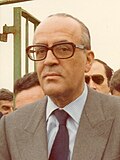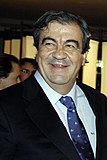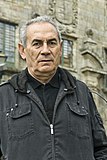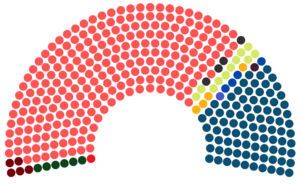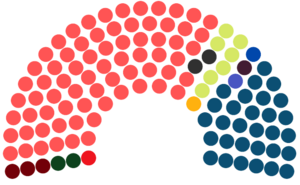1990 Paretian general election: Difference between revisions
No edit summary |
No edit summary |
||
| Line 41: | Line 41: | ||
| 4data1 = | | 4data1 = | ||
| image2 = [[File: | | image2 = [[File:Visita de Leopoldo Calvo-Sotelo a El Puerto de Santa María (centered).jpg|160x160px]] | ||
| colour2 = 0b4f73 | | colour2 = 0b4f73 | ||
| leader2 = [[Martí Solaries]] | | leader2 = [[Martí Solaries]] | ||
| Line 121: | Line 121: | ||
| 4data6 = | | 4data6 = | ||
| image7 = [[File: | | image7 = [[File:Cavaco Silva 1988.png|160x160px]] | ||
| colour7 = 0047AB | | colour7 = 0047AB | ||
| leader7 = [[Ricardo Martins]] | | leader7 = [[Ricardo Martins]] | ||
Revision as of 22:29, 27 January 2023
This article is incomplete because it is pending further input from participants, or it is a work-in-progress by one author. Please comment on this article's talk page to share your input, comments and questions. Note: To contribute to this article, you may need to seek help from the author(s) of this page. |
| |||||||||||||||||||||||||||||||||||||||||||||||||||||||||||||||||||||||||||||||||||||||||||||||||||||||||||||||||||||||||||||||||
All seats in the Senado da Paretia and regional legislatures | |||||||||||||||||||||||||||||||||||||||||||||||||||||||||||||||||||||||||||||||||||||||||||||||||||||||||||||||||||||||||||||||||
|---|---|---|---|---|---|---|---|---|---|---|---|---|---|---|---|---|---|---|---|---|---|---|---|---|---|---|---|---|---|---|---|---|---|---|---|---|---|---|---|---|---|---|---|---|---|---|---|---|---|---|---|---|---|---|---|---|---|---|---|---|---|---|---|---|---|---|---|---|---|---|---|---|---|---|---|---|---|---|---|---|---|---|---|---|---|---|---|---|---|---|---|---|---|---|---|---|---|---|---|---|---|---|---|---|---|---|---|---|---|---|---|---|---|---|---|---|---|---|---|---|---|---|---|---|---|---|---|---|---|
| |||||||||||||||||||||||||||||||||||||||||||||||||||||||||||||||||||||||||||||||||||||||||||||||||||||||||||||||||||||||||||||||||
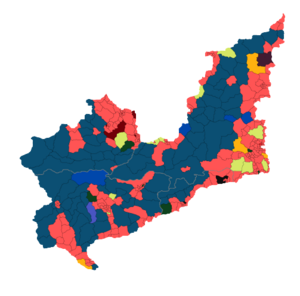 Map of the results of the election, showing the constituencies and the party they voted for. | |||||||||||||||||||||||||||||||||||||||||||||||||||||||||||||||||||||||||||||||||||||||||||||||||||||||||||||||||||||||||||||||||
| |||||||||||||||||||||||||||||||||||||||||||||||||||||||||||||||||||||||||||||||||||||||||||||||||||||||||||||||||||||||||||||||||
The 1990 Paretian general election was held on August 2 1990. It is widely considered one of the most important elections in Paretian history as it results saw record numbers, specifically in reference to the victorious Social Democrats, lead by Julío Pires, who were able to use their record number of seats to enact their agenda, especially the eventual referendum to join the Euclean Community the following year, which succeeded.
Background
The election would come during the incumbent rule of New Democracy, under Premier Martí Solaries, along with an alliance with the Catholic Democracy Party and Citizens Movement. The country was still suffering the effects of inflation and recession throughout the 1980s, Premierships of Manuela Morais and Solaries had failed to come through on relieving the economy. Morais also failed on making the promise of joining the Euclean Community, which became a major issue. The Social Democrats were a rising party that had come to replace the splintered Paretian Labour Party. The Social Democrat's predecessor party, the Euclean Social Democratic Party of Paretia, was founded on focusing on joining the Euclean Community, this policy continued into the Social Democrats.
The leader of the Social Democrats was the charismatic Julío Pires, who had left the party leadership position for a short period in the middle of the 1980s due to personal reasons. He returned to the position in 1985. He had been able to reunite the centre-left which had fallen apart during scandals and division under the Premiership of Eugênio Dantas in the late 1970s. The new Social Democrats ran on the promise of a hastly joining of the Euclean Community. The party became close friends with EC social democratic parties, including in Gaullica, Estmere, and Hennehouwe. Julío Pires would be able to make close friendships with EC social democrats, helping aid his case for convincing voters on his promise to join the EC. The left in Paretia would rally behind the Social Democrats in their campaigns.
The right-wing was rallied behind New Democracy during the early 1980s under Timoteo Cabral, but other centre-right parties such as the Catholic Democracy Party and the Citizens Movement made it hard for the New Democracy to get a large foothold on the right in the country, they were more lenient on joining the Euclean Community compared to the ND, which decided to make their position against joining the community. This would cause problems in the ND, as some members of the parties supported joining the EC for economic reasons, this lead to a loss of confidence for voters in the party, who did not get a clear message on whether the party was keen on joining the Community or not.
For the young parties such as Together for Liberty and Citizens Movement, they faced the choice of the EC issue quite easily. They were massively in support of joining the community, making any centre-right to centre government less likely to stay out of the Community. The Catholic Democracy Party was much more split on the issue, but most of the party would be in support of joining the community. On the far-left, the Paretian Section of the Workers' International was against joining the community, claiming that the community is a capitalist empire. The Greens were in support of joining the community.
The regional parties such as the Tosuton Front and Visegan Party saw rising support during the late 1980s. For these two regionalist parties they supported joining the community. There was slightly less support in the Party for Luzelese Interest or the Esmeira Party, but in general the regionalist parties were in support of joining the EC.
These parties wanting the join the EC isolated New Democracy's position, conflicting messaging in the party devastated confidence in the party. The Social Democrats were in a perfect position to take advantage and win big.
Parties
Campaign
The Social Democrats held rallies nearly constanty during the later 1980s, even ouside of the election cycles. They began to become more frequent during the 1990 election cycle, they made campaign promises of joining the Euclean Community, in what they called a "swift and strategic manner". They also promised major economic and social reforms to make Paretia an acceptable EC country, such as banning the death penalty and raising the minimum wage. Their rallies were massive in scale, and became an indicator of the results to come in the election.
On the right New Democracy promised to "work with the EC" but never outright promised to join them. They began to hold rallies across their main voting base but eventually attempted to get support in areas that would likely go Social Democrat. Their rallies were much smaller than the Social Democrats, which hurt confidence in the party in the election.
For the smaller parties, they promised to join the Euclean Community as well. But fears that they would not be able to achieve the promises such as social and economic reforms like the larger Social Democrats made it harder for them to sell their message to voters. Regional parties were able to make promises of more autonomy for the regions under EC membership.
The election cycle was not very hyperpartisan and violence was very little during it. Solaries would attempt a strategy of trying to get the Tosutons to vote right-wing, with campaign rallies being increasingly common in his homeland of Tosutonia. This strategy would prove to be a failure on the ND.
Results
| Party | Votes | % | Result | +/- | |
|---|---|---|---|---|---|
| Social Democrats | 63.83% | 237 / 360
|
|||
| New Democracy | 21.83% | 86 / 360
|
|||
| Together for Liberty | 6.3% | 11 / 360
|
|||
| Greens | 1.67% | 6 / 360
|
|||
| Tosuton Front | 1.38% | 5 / 360
|
|||
| Citizens Movement | 1.13% | 4 / 360
|
|||
| Catholic Democracy Party | 1.13% | 4 / 360
|
|||
| Visegan Party | 1.12% | 4 / 360
|
|||
| Paretian Section of the Workers' International | 0.30% | 1 / 360
|
|||
| Esmeira Party | 0.11% | 1 / 360
|
|||
| Luzelese Representation Party | 0.11% | 1 / 360
|
|||
| Party for Luzelese Interests | 0.10% | 1 / 360
|
|||
| Other | 0.9% | 0 / 360
|
|||
| Party | Votes | % | Result | +/- | |
|---|---|---|---|---|---|
| Social Democrats | 63.83% | 71 / 120
|
|||
| New Democracy | 21.83% | 30 / 120
|
|||
| Together for Liberty | 6.3% | 7 / 120
|
|||
| Tosuton Front | 1.38% | 3 / 120
|
|||
| Greens | 1.67% | 2 / 120
|
|||
| Citizens Movement | 1.13% | 1 / 120
|
|||
| Catholic Democracy Party | 1.13% | 1 / 120
|
|||
| Visegan Party | 1.12% | 1 / 120
|
|||
| Paretian Section of the Workers' International | 0.30% | 1 / 120
|
|||
| Esmeira Party | 0.11% | 1 / 120
|
|||
| Luzelese Representation Party | 0.11% | 1 / 120
|
|||
| Party for Luzelese Interests | 0.10% | 1 / 120
|
|||
| Other | 0.9% | 0 / 120
|
|||
Government formation
| Investiture Julío Pires (Social Democrat) | ||
| Ballot → | 4 Aug 1990 | |
|---|---|---|
| Required majority → | 180 out of 360 | |
249 / 360
| ||
108 / 360
| ||
Abstentions
|
1 / 360
| |
| Absentees | 0 / 360
| |

